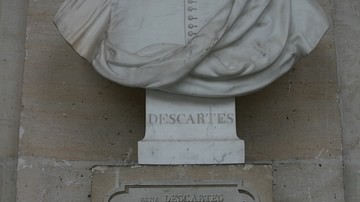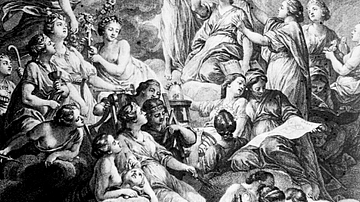Search
Search Results

Definition
René Descartes
René Descartes (1596-1650) was a French mathematician, natural scientist, and philosopher, best known by the phrase 'Cogito ergo sum' ('I think therefore I am'). He published works on optics, coordinate geometry, physiology, and cosmology...

Image
René Descartes
Portrait of René Descartes (1596-1650), after Frans Hals, c. 1649-1700.
Louvre, Paris.

Image
Descartes Bust
Bust of French philosopher René Descartes (1596-1650.)
Versailles.

Image
Descartes' House
Maison Descartes, the house where the philosopher René Descartes (1596-1650) lived in the Netherlands.
De Weteringschans, Amsterdam.

Definition
Menelaus of Alexandria
Menelaus of Alexandria was a Greek astronomer, scientist, and mathematician who lived around 100 CE. Menelaus made a significant and lasting contribution to the fields of astronomy, geometry, and trigonometry. His major work, the Spherics...

Video
Thales' Theorem
The powerful procedures possible with modern mathematics are rooted in logic that began thousands of years ago. Thales' Theorem demonstrates one style of early mathematical logic, a logic that is relevant and important today.

Definition
The Enlightenment
The Enlightenment (Age of Reason) was a revolution in thought in Europe and North America from the late 17th century to the late 18th century. The Enlightenment involved new approaches in philosophy, science, and politics. Above all, the...

Article
The Pythagorean Theorem: The Way of Truth
Pythagoras (569-475 BC) is recognized as the world's first mathematician. He was born on the island of Samos and was thought to study with Thales and Anaximander (recognized as the first western philosophers). Pythagoras believed that...

Article
Anselm's Proslogion
The Proslogion (Latin for Address or Discourse; the title was chosen because it is written in the form of a prayer addressed to God) is a book written by the medieval theologian St. Anselm of Canterbury (c. 1033-1109). It is of great significance...

Article
Women Scientists in the Scientific Revolution
Women scientists during the Scientific Revolution (1500-1700) were few in number because male-dominated educational institutions, as well as scientific societies and academies, barred women entry, meaning that few had the education or opportunity...